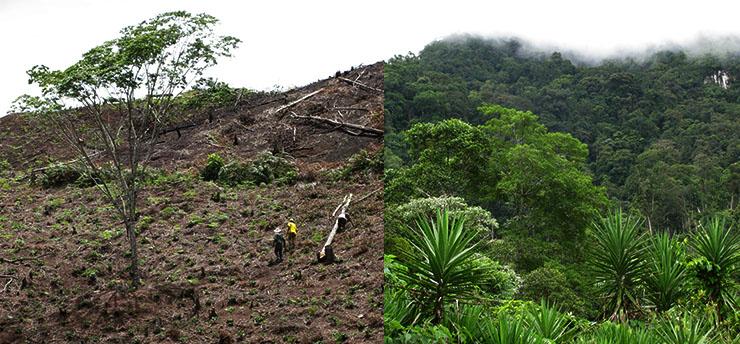Solutions for Deforestation In The Coffee Industry
Expansion of coffee cultivation is the primary threat to cloud forest/rainforest and national parks in Honduras. Strictly High Grown (SHG) coffee shares the same elevation as cloud forest. Cloud forests are deforested to make way for coffee farms. In addition, vast quantities of firewood are needed to fuel conventional industrial coffee dryers.

According to coffee industry estimates, in order to keep up with consumer demand for coffee, coffee production will need to triple by 2050. This will require an area the size of Honduras and Nicaragua combined to be converted to coffee. The majority of the of this expansion would come at the expense of forest habitat, threatening the remaining forests in Central America (Sustainable Coffee Challenge).
These high-elevation forests serve as the headwaters for the watersheds that sustain coffee growing communities and supply the municipalities with drinking water. In Honduras they also supply the nation’s largest electric utility with hydropower providing 25% of the electricity demand.
The firewood used to fuel industrial coffee dryers equates to approximately 3 cm2 of forest habitat per cup of coffee. Our hybrid solar/biofuel coffee driers eliminate the use of fuel wood in industrial coffee drying. An estimated 6,509 ha of forest is lost annually to provide wood for conventional dryers.
Innovation in Coffee Production & Processing
Our carbon-neutral processing (hybrid solar & biofuels) eliminates use of tropical firewood in industrial coffee drying and reduces electricity consumption by 80%, allowing onsite electricity generation with locally produced biofuels.
Our Integrated Open Canopy™ agroforestry system consists of an equal area of forest habitat as area of under coffee cultivation. This forest area on private lands (coffee farms) consists of existing forest, regenerating forest, or a combination of both. These high yielding farms allow farmers to maintain forest habitat on their farms.
Our goal is to stop deforestation due to coffee production and restore forest habitat to capture carbon and mitigate climate change while providing carbon-neutral processing using renewable energy technology for industrial coffee drying.
Café Solar® coffee is maintaining and/or restoring forest habit on coffee farms, while eliminating the use of firewood in industrial dryers to dry the annual harvest. Expanding coffee production is the primary threat to high elevation forests and national parks in Honduras, Central America’s largest coffee producer. The 12,000 km2 Yoro Biological Corridor seeks to scale up carbon-neutral processing and adoption of land sparing coffee cultivation in the coffee regions connecting eight threatened national parks. The US and Honduran Forest Services have endorsed our forest-friendly production and processing methods.
Each solar/biomass drying tower with Café Solar® saves nearly 1 hectare of forest each year.
For a typical cup of conventionally dried coffee, nearly a half square inch of forest is lost to provide the firewood to dry the coffee beans.
Conventional coffee drying has been declared and “environmental emergency” by the Costa Rican Coffee Institute.
Café Solar® uses forest-friendly production and patented processing methods that help to reduce deforestation. Café Solar® is eliminating one cause of deforestation–the burning of wood from rainforests as fuel to dry coffee beans. Café Solar® is promoting forest-friendly coffee farms that have forest buffers around the areas of cultivation.


